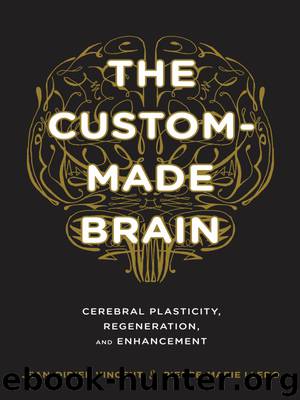The Custom-Made Brain by Garey Laurence Lledo Pierre-Marie Vincent Jean-Didier

Author:Garey, Laurence, Lledo, Pierre-Marie, Vincent, Jean-Didier
Language: eng
Format: epub
Tags: -
Publisher: Columbia University Press
Published: 2014-05-09T04:00:00+00:00
The Brain Under Stress
When we experience an unpleasant, potentially dangerous event, our brain chemistry prepares us for flight, an imminent fight, or to inhibit our actions and opt for the status quo. Of course the chosen behavioral strategy will correspond to the situation that provoked this stress, but it will also draw from past experience. Adrenaline is the hormone to save the situation: it enables us to mobilize vital energy for flight or fight. It is the physiological response to acute stress, which is experienced as acceleration of heart rhythm, raised blood pressure, palpitations, and shortness of breath. We feel these effects when, for example, we are walking in the yard and notice in the distance something that looks like a snake but is only a garden hose. Happily, this symptomatology lasts no longer than a matter of minutes. The phylogenetic origin of this form of quick emotion is very distant. It appeared with the limbic system of mammals. This acute reaction to stress can be exciting and even beneficial in alerting our senses.
On the other hand, when such events are repeated indefinitely too much stress ends up being exhausting or even a danger to health. This chronic stress represents a situation that progressively occupies the whole body and mind and results in the subject seeing no favorable issue. Hopeless, he gives up looking for a solution and accepts the unpleasant situation. High levels of glucocorticoids can be detected and remain in the system for years.16 As we have seen, the hippocampus plays an important role in learning and declarative memory (memory of what we can describe verbally, rather than skill). It is very exposed to the dangerous effects of high doses of cortisol. Consequently, chronic stress can cause deterioration in memory, which disturbs learning and adaptation. The other harmful effect of high cortisol, and thus of stress, in the hippocampus is an increased susceptibility to depression.
So although we are relatively well adapted to physiological effects of acute stress (such as ancient man experienced when seeing a predator), we remain vulnerable in situations that lead to chronic stress. We now understand the mechanism by which chronic stress alters serotonin receptors (increased 5-HT2A and decreased hippocampal 5-HT1A). Similar modifications in receptors are seen in suicide victims, and prolonged administration of antidepressants produces opposite changes to those of chronic stress.
We have known for some time that depressives have a hyperactive hypophyseal-pituitary-adrenal axis (HPA) and that prolonged activation of the HPA tends to favor depression. Chronic stress, by challenging the HPA, leads to basically irreversible structural changes in certain brain regions. In particular, the hippocampus suffers considerable loss of neurons during prolonged stress, notably related to the desensitization of glucocorticoid receptors, leading to negative trophic effects. In sufferers from diseases that overproduce cortisol (for example Cushing syndrome) we see a high incidence of depression that becomes treatable when the cortisol level reaches normal levels. The final product of the HPA, glucocorticoids, plays a role in depression by influencing several neurotransmitter systems, including serotonin, noradrenaline, and dopamine, the chemical triad strongly implicated in depression.
Download
This site does not store any files on its server. We only index and link to content provided by other sites. Please contact the content providers to delete copyright contents if any and email us, we'll remove relevant links or contents immediately.
Sapiens: A Brief History of Humankind by Yuval Noah Harari(14368)
The Tidewater Tales by John Barth(12651)
Mastermind: How to Think Like Sherlock Holmes by Maria Konnikova(7323)
Do No Harm Stories of Life, Death and Brain Surgery by Henry Marsh(6937)
The Thirst by Nesbo Jo(6932)
Why We Sleep: Unlocking the Power of Sleep and Dreams by Matthew Walker(6706)
Life 3.0: Being Human in the Age of Artificial Intelligence by Tegmark Max(5547)
Sapiens by Yuval Noah Harari(5366)
The Body: A Guide for Occupants by Bill Bryson(5080)
The Longevity Diet by Valter Longo(5058)
The Rules Do Not Apply by Ariel Levy(4957)
The Immortal Life of Henrietta Lacks by Rebecca Skloot(4576)
Animal Frequency by Melissa Alvarez(4461)
Why We Sleep by Matthew Walker(4434)
The Hacking of the American Mind by Robert H. Lustig(4375)
Yoga Anatomy by Kaminoff Leslie(4358)
All Creatures Great and Small by James Herriot(4311)
Double Down (Diary of a Wimpy Kid Book 11) by Jeff Kinney(4261)
Embedded Programming with Modern C++ Cookbook by Igor Viarheichyk(4173)
